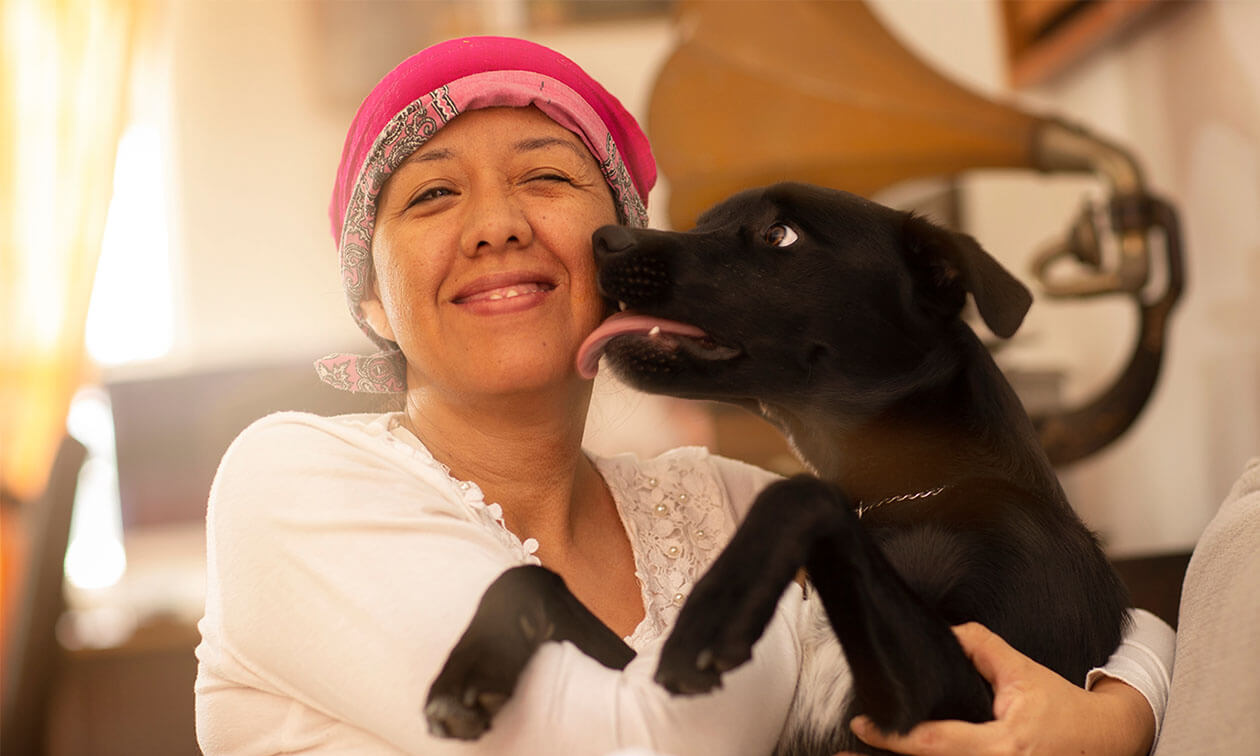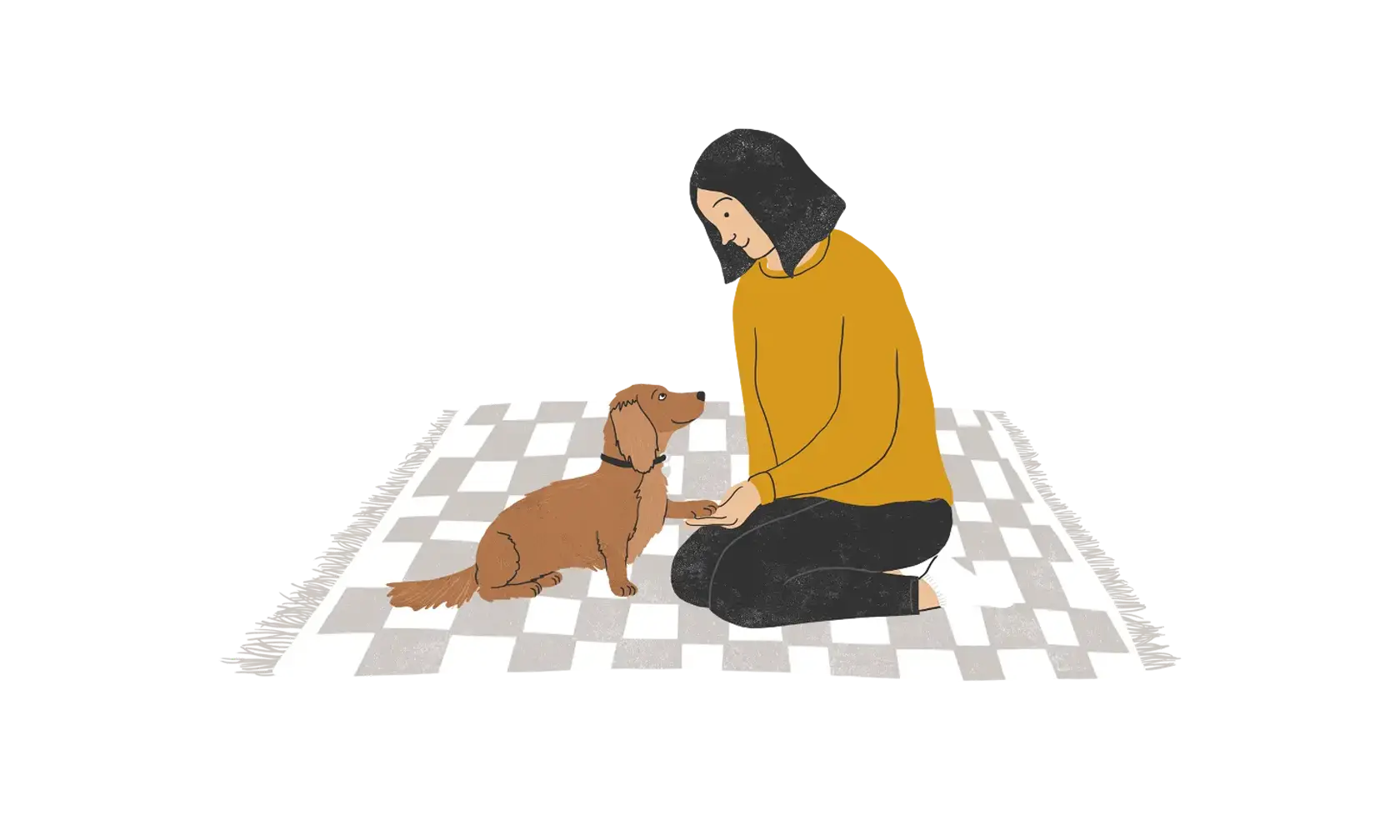If you’ve ever caught your dog in the middle of an extended licking session, you’re not alone. From a quick grooming lick to what feels like nonstop licking, this common behavior can leave many pet owners puzzled. Dogs lick for a variety of reasons — some instinctual, some physical, and others emotional. Understanding what’s behind the licking can help you know when it’s normal and when it might signal a deeper issue.
Why Do Dog Lick You?
Dogs often lick to show affection. Licking you is a way for dogs to show their love, akin to a dog's version of giving kisses. Licking releases endorphins in dogs, creating a calming and pleasurable sensation.
Dogs also lick us because they’re nervous or stressed, for attention, out of boredom, or because they like the taste of salt on our skin.
Why Do Dogs Lick Your Hands?
Beyond the reasons already mentioned, your might hands smell like food you’ve recently eaten, and your dog wants a taste of that. Plus, your hands may be the closest or most convenient place to lick, and they want to express their affection or get your attention.
Why Do Dogs Lick Your Face?
Similar to reasons why dogs lick your hands, dogs may lick your face for a taste of whatever food you’ve eaten. If you’ve been sweating or crying, they’re also looking for a taste of salt, which they love.
Sometimes, however, your dog just loves you and wants to express their affection for you. It can also be a sign of submission.
Why Do Dogs Lick Themselves?
Licking is a common behavior that serves several purposes for our dogs.
Grooming
Licking plays a crucial role in a dog's grooming routine. Like cats, dogs use their tongues to clean their fur, removing dirt, debris, and loose hair.
Pain or Injury
When a dog injures themselves or is in pain, they will often lick the painful area. Dogs will naturally want to lick open wounds, but it's important to prevent this as it can introduce bacteria and cause complications with healing.
Other Health Issues
Frequent licking in specific area may point to problems. For example, if your dog constantly licks their nails, they may have a cracked nail causing discomfort. Keeping your dog's nails trimmed will help prevent this. Licking of the groin area can indicate infection in the urinary tract. Licking the base of the tail or rectum can happen with anal sac discomfort. Inform your veterinarian if your dog is licking a specific area of their body.
Boredom
Dogs need mental stimulation and exercise, and when they don't get enough, they may channel excess energy into licking themselves. You may notice that they start licking when they have nothing else to do but aren't tired enough to sleep.
Stress or Anxiety Relief
Licking is a natural way for dogs to calm themselves down. The repetitive nature of licking helps lower heart rate, and dogs may lick themselves when they are feeling stressed or anxious. This self-soothing behavior releases endorphins, providing a temporary sense of comfort and calming their nerves.
Itchy Skin or Allergies
Your dog may be licking if they have dry or itchy skin. Constant licking can indicate irritation or discomfort caused by allergens, such as certain foods, environmental factors, or even flea bites. Other causes of itchy skin include atopic dermatitis, parasites, and infection.
When Is Dog Licking a Problem?
Your dog's licking can be a problem when it becomes excessive and obsessive, leading to skin irritation, hair loss, open sores, hot spots, or improper wound healing. Compulsive licking may interfere with their normal routine, so consult your veterinarian for a proper diagnosis and treatment plan.
You should be cautious when your dog licks you and be sure to wash your hands after. you may want to be extra cautious if they eat their own feces, eat raw food, or you are immunocompromised. Your dog should be regularly tested for parasites, up-to-date on vaccinations, and on parasite preventatives year-round to further lower risks.
How To Stop Your Dog's Excessive Licking
Stopping or preventing excessive licking will depend on the reason why your dog is licking. Talk to your vet about your dog’s licking so they can help identify the issue and treatment.
Treatment for Underlying Health Issues
No amount of training will stop licking caused by pain, skin conditions, or infections. Your vet can help identify and treat underlying health concerns.
Regular Grooming
Ensure your dog's skin and coat are clean and in good condition with regular grooming. Use gentle shampoos suitable for your dog's skin type and consider using a moisturizing spray or conditioner to keep their skin hydrated. Fragrance-free or hypoallergenic are best.
Exercise and Mental Enrichment
Engage your dog in activities that keep their mind occupied, such as puzzle toys, interactive feeders, or training sessions. Providing mental stimulation and plenty of exercise can help redirect their energy and reduce the need for self-licking.
Block Access to Areas Your Dog Licks
If your dog persists in licking despite addressing any medical or behavioral causes, you might consider using wraps, socks, clothing, or a cone to prevent your dog from licking certain areas. Keep in mind that your dog can remove, chew, or even ingest wraps and other things you put on them. Watch them closely and check the area regularly for signs that your dog is bothering the protectant they're wearing.
Calmly Interrupt and Redirect
If you catch your dog licking themselves or they are licking you too much, calmly interrupt them and give them something else to do. Redirecting their attention to a chew or even a treat mat to lick can direct their behavior to something more appropriate.Excessive licking can be frustrating, but with patience and the right approach, it can often be managed. If the behavior persists, a veterinarian or certified behaviorist can help guide you toward the best solution for your dog’s needs.
ZPC-04474



